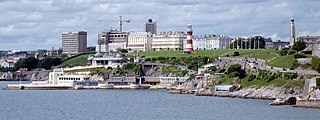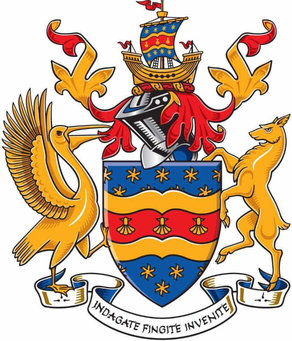
Plymouth is a port city and unitary authority in South West England. It is located on the south coast of Devon, approximately 36 miles (58 km) south-west of Exeter and 193 miles (311 km) south-west of London. It is bordered by Cornwall to the west and south-west.

Plymouth Argyle Football Club is a professional football club based in the city of Plymouth, Devon, England, that will compete in the EFL Championship, the second tier of English football, following promotion from the 2022–23 EFL League One. They have played at Home Park, known as the "Theatre of Greens", since 1901. The club takes its nickname, "The Pilgrims", from an English religious group that left Plymouth for the New World in 1620.

Plymouth Hoe, referred to locally as the Hoe, is a large south-facing open public space in the English coastal city of Plymouth. The Hoe is adjacent to and above the low limestone cliffs that form the seafront and it commands views of Plymouth Sound, Drake's Island, and across the Hamoaze to Mount Edgcumbe in Cornwall. The name derives from the Anglo-Saxon word hoh, a sloping ridge shaped like an inverted foot and heel.

The University of Plymouth is a public research university based predominantly in Plymouth, England, where the main campus is located, but the university has campuses and affiliated colleges across South West England. With 18,410 students, it is the 57th largest in the United Kingdom by total number of students.

CTrain is a light rail rapid transit system in Calgary, Alberta, Canada. Much of the system functions as a high-capacity light metro, while in the downtown free-fare zone, trains transition into a tram with a dedicated right-of-way. The CTrain began operation on May 25, 1981 and has expanded as the city has increased in population. The system is operated by Calgary Transit, as part of the Calgary municipal government's transportation department. In 2022, the system had a ridership of 61,889,500, or about 228,800 per weekday as of the fourth quarter of 2022, making it one of the busiest light rail transit systems in North America. Approximately 45% of workers in Downtown Calgary take the CTrain to work.

Drake's Island is a 6.5-acre (2.6-hectare) island lying in Plymouth Sound, the stretch of water south of the city of Plymouth, Devon. The rocks which make up the island are volcanic tuff and lava, together with marine limestone of the Devonian period. For more than 400 years the island was fortified.

The Plymouth Raiders was a professional basketball team based in Plymouth, England. The team competed in the British Basketball League, the country's premier basketball competition, from 2004 to 2021.

Home Park is a football stadium in Plymouth, England. The ground has been the home of EFL Championship club Plymouth Argyle since 1901.

Plymouth railway station serves the city of Plymouth, Devon, England. It is on the northern edge of the city centre, close to the North Cross roundabout. It is the second busiest station in the county of Devon, and the largest of the six surviving stations in Plymouth.

Plymouth's Central Park is situated to the north-east of Plymouth city centre in south-west Devon, England. Covering 68 hectares, Central Park is the largest park in Plymouth. It was created in 1928 with the aim to improve the health of the city's residents. The park is trust land; developments on the land must be for the purpose of leisure activities.

Westfield Eastgardens is a large shopping centre in the suburb of Eastgardens in the South-Eastern Suburbs of Sydney.

City College Plymouth is a tertiary institution and further education college in South West England offering a range of technical, professional and vocational qualifications, Apprenticeships, Access to Higher Education and Foundation Degree courses, plus professional and bespoke training to local employers.

Plymouth Science Park, previously known as Tamar Science Park, is a science and technology park located in Plymouth, Devon, in southern England.


The History of Plymouth in Devon, England, extends back to the Bronze Age, when the first settlement began at Mount Batten a peninsula in Plymouth Sound facing onto the English Channel. It continued as both a fishing and continental tin trading port through the late Iron Age into the Early Medieval period, until the more prosperous Saxon settlement of Sutton, later renamed Plymouth, surpassed it. With its natural harbour and open access to the Atlantic, the town found wealth and a national strategic importance during the establishment of British naval dominance in the colonisation of the New World. In 1620 the Pilgrim Fathers departed from Plymouth to establish the second English colony in America. During the English Civil War the town was besieged between 1642 and 1646 by the Royalists, but after the Restoration a Dockyard was established in the nearby town of Devonport. Throughout the Industrial Revolution Plymouth grew as a major mercantile shipping industry, including imports and passengers from the US, whilst Devonport grew as a naval base and ship construction town, building battleships for the Royal Navy – which later led to its partial destruction during World War II in a series of air-raids known as the Plymouth Blitz. After the war was over, the city centre was completely rebuilt to a new plan.

Mayflower was an English ship that transported a group of English families, known today as the Pilgrims, from England to the New World in 1620. After a grueling 10 weeks at sea, Mayflower, with 102 passengers and a crew of about 30, reached what is today the United States, dropping anchor near the tip of Cape Cod, Massachusetts, on November 21 [O.S. November 11], 1620.
The following is a timeline of the history of the city of Plymouth, Devon, England.

Sutton Harbour, formerly known as Sutton Pool, is the original port of Plymouth in Devon, England. It is still a busy fishing port and marina and is bounded on one side by the historic Barbican district. It is famous as the last departure point in England of the Mayflower, the ship that carried the Pilgrim Fathers to the New World.

















